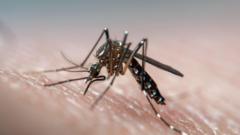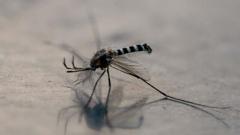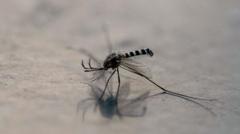Research from the University of California, Irvine reveals that altering the genetic pathways of male Aedes aegypti mosquitoes, known carriers of diseases like dengue and Zika, can effectively incapacitate their mating abilities, thus potentially controlling their populations.
Innovative Approach to Combat Dengue: Turning Mosquitoes Deaf

Innovative Approach to Combat Dengue: Turning Mosquitoes Deaf
Scientists have discovered a novel method to reduce mosquito-borne diseases by rendering male mosquitoes incapable of mating.
Researchers are turning their attention towards an unexpected and innovative tactic to combat diseases transmitted by mosquitoes, such as dengue, yellow fever, and Zika virus. By making male mosquitoes deaf, scientists hope to prevent them from successfully mating and breeding. The study was conducted by a team at the University of California, Irvine, focusing on the Aedes aegypti species, notorious for infecting approximately 400 million people globally each year.
The mating process of mosquitoes is quite curious, as it involves intricate aerial displays where males pursue females by detecting the distinctive sounds of their wingbeats. Researchers modified the genetic pathway responsible for sound perception in male mosquitoes, targeting a specific protein, trpVa, crucial for hearing. As a result, these genetically modified males failed to recognize the sounds of potential mates even after being confined with female counterparts for several days.
In stark contrast to their deaf counterparts, the wild male mosquitoes exhibited typical mating behavior, copulating multiple times and successfully fertilizing nearly all nearby females. The research, published in the journal PNAS, highlighted that the intervention was conclusive; deaf males did not mate at all, utterly disrupting normal reproductive patterns.
Expert opinions, such as that of Dr. Joerg Albert from the University of Oldenburg, affirm the significance of this research. He posits that targeting the sense of hearing presents a promising avenue for effectively controlling mosquito populations but calls for careful management and further studies. The findings imply that male mosquitoes’ hearing is not merely supplementary but essential for reproduction, hinting that their extinction may follow if these capabilities are lost.
In addition to genetic modifications, other proposed methods for mosquito control include the release of sterile males in regions heavily infested with disease-spreading mosquitoes. While mosquitoes are often maligned for their role in disease transmission, they do serve critical functions within ecosystems—acting as food sources for various animals and contributing to pollination processes. The challenge remains to strike a balance between public health needs and ecological considerations.










